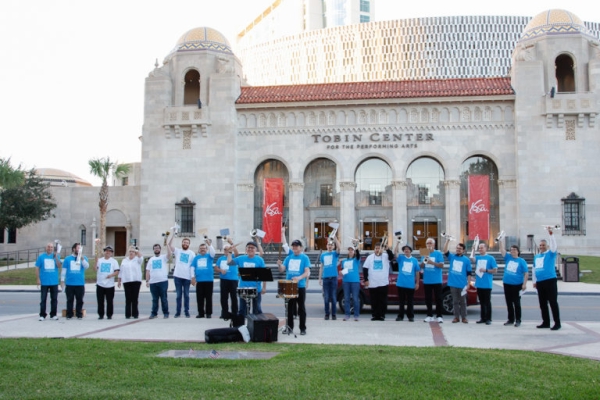An Intolerable Situation in San Antonio

Posted Date: January 19 2022
The following article appeared in the December 2021 issue of Senza Sordino and is reprinted with permission. Senza Sordino is the Official Publication of the International Conference of Symphony and Opera Musicians, an AFM Players' Conference.
A group of trumpeters cheers after a fanfare opening a rally for the Musicians of the San Antonio Symphony on October 29, 2021
Photo credit: https://www.gracescalzophotography.com
As all of ICSOM knows, the musicians of the San Antonio Symphony have been on an unfair labor practice strike since September 27, following management’s unilateral declaration of impasse and imposition of intolerable terms on September 26.
During the summer of 2020, the musicians met with our management and board to negotiate drastic, pandemic-related modifications to our CBA for the 2020-2021 season only. In addition to a significant reduction in weeks and weekly salary, a clause was included allowing either side to request before January 15, 2021 to renegotiate the final year of the contract (2021–22), specifically due to the uncertainties of the pandemic. This reopener also included a requirement that we engage in Interest-Based Bargaining (IBB) through at least May 31, 2021 before either side could request a return to traditional bargaining.
The request to use IBB came from management, and everyone involved went through IBB training with FMCS facilitators in February 2021.
Negotiations for our third year reopener started slowly, partly because the musicians also requested to reopen our 2020–21 season Memorandum of Agreement after the Symphony Society of San Antonio (SSSA) received its second PPP loan, but also because the required IBB process was excruciatingly cumbersome. The MOA negotiations ended with no satisfaction to the musicians. We found the IBB process to be ineffective, and we did not have a positive experience with the FMCS mediators assigned to us. The musicians requested a return to traditional bargaining at the beginning of summer 2021.
It was only then that we finally understood what we were up against. Because the IBB process did not allow for any open discussion of proposals, we did not receive the SSSA’s first proposal until the summer. It was jaw-dropping. Management’s first proposal included a 50% pay cut (to just over $17,000 base pay) for all 72 musicians. But they also presented an alternative proposal, with slightly higher pay, if we were willing to toss many of our colleagues under the bus by converting them to “B” contract players.
The ensuing negotiating sessions were frustrating and unproductive. On September 3, the musicians offered a proposal that would have included a 17% pay cut, including four new furlough weeks, along with a joint musician-management fundraising initiative. This was rejected out of hand. Management responded by issuing a “last, best, and final” offer (LBFO) that would have created a core of 42 musicians with “A” contracts ($24,000 base pay plus benefits) and a second class of 26 musicians with “B” contracts ($11,250 guaranteed minimum, no health insurance, no benefits). Four currently vacant positions would be eliminated. The committee brought the LBFO to our colleagues for a vote, and it was unanimously rejected.
On September 26, management declared impasse and imposed the terms contained in the LBFO. Because management’s declaration of impasse was unlawful—we were still willing to negotiate—and because we could not possibly work under those conditions, the musicians called an unfair labor practice strike on September 27.
San Antonio Symphony Negotiating Committee Chair, Mary Ellen Goree delivers remarks at a rally for the Musicians of the San Antonio Symphony on October 29, 2021Photo credit: https://www.gracescalzophotography.com
It had become increasingly clear through the course of negotiations that our management was using the reopener provision in the 2020 MOA not as a way to deal with uncertainties related to the pandemic, but as an excuse to address what they deemed to be long-standing problems in the organization. This is evidenced by the fact that the SSSA has been proposing an A/B orchestra as far back as 2007. So, along with the strike, the musicians filed a grievance with the SSSA for violation of the reopener provision, as well as unfair labor practice charges with the NLRB. Both the grievance and the charges are currently in process.
It’s important to note that these events are transpiring after decades of financial mismanagement on the part of the SSSA along with a lengthy history of musicians being asked for and agreeing to take pay cuts, with assurances every time that those cuts would enable our board and management to get their house in order moving forward.
We are also still living with the fallout of the cannibalization of our endowment in the 1990s to pay salaries—a shortsighted move that not only wiped out our endowment for the future, but also alienated a number of very generous donors who had expected to fund the symphony in perpetuity, not just keep the lights on.
So what now? Up to this point, our management and board has been resistant to any suggestion that their plan will result in the destruction of the Symphony, despite all evidence. Musicians are already leaving for greener pastures. Public opinion is squarely in the musicians’ corner. We need a change in our leadership’s direction, or more directly, a change in leadership.
Mary Ellen Goree, Negotiating Committee Chair, San Antonio Symphony
